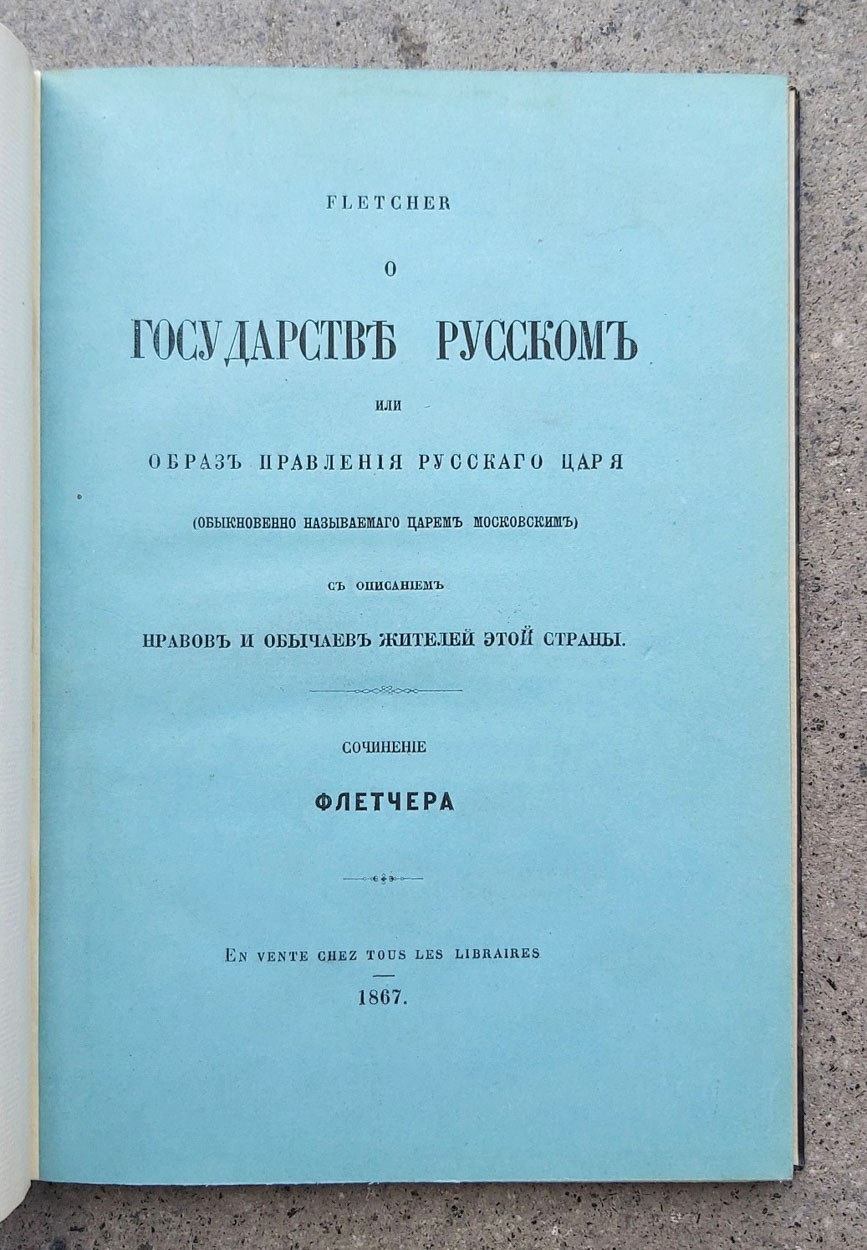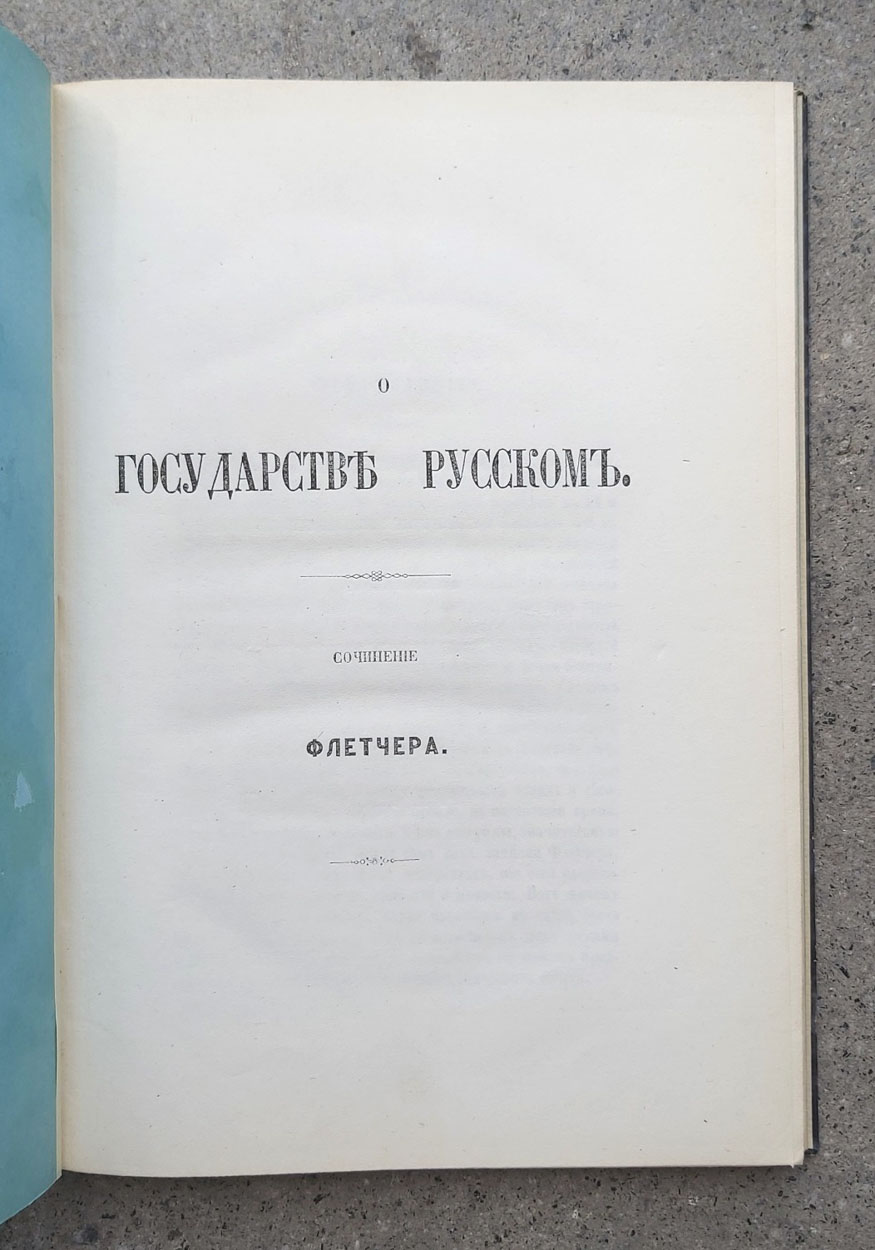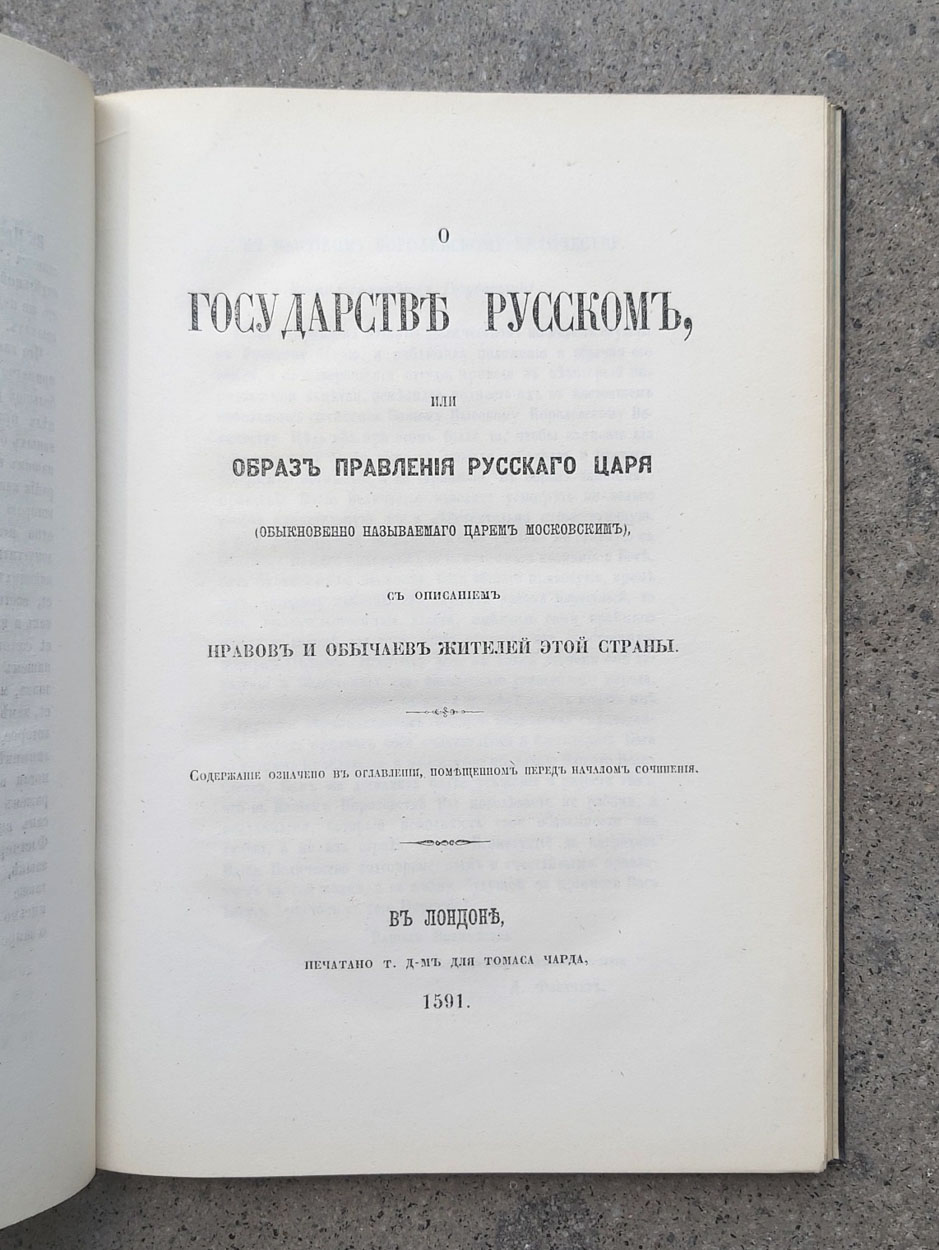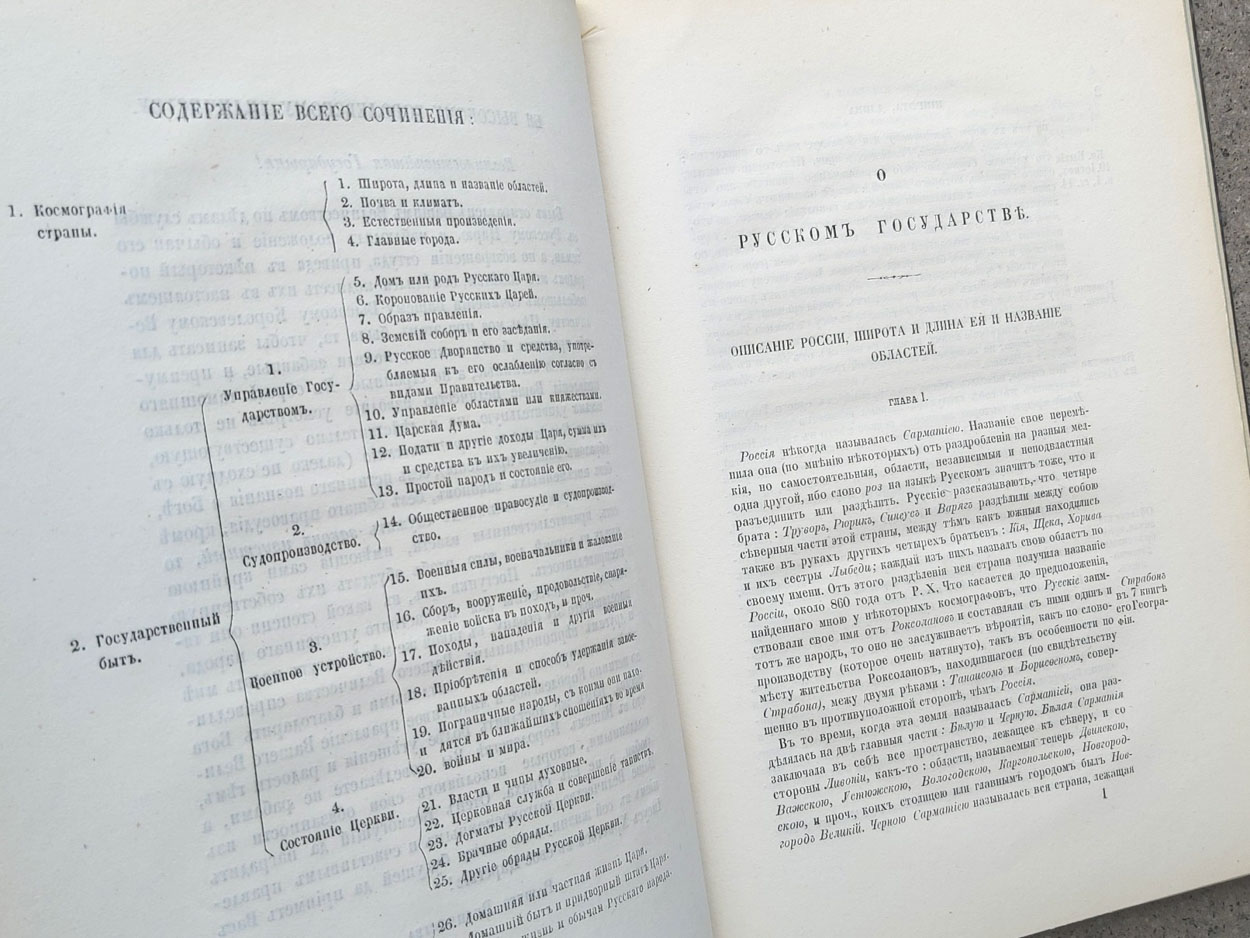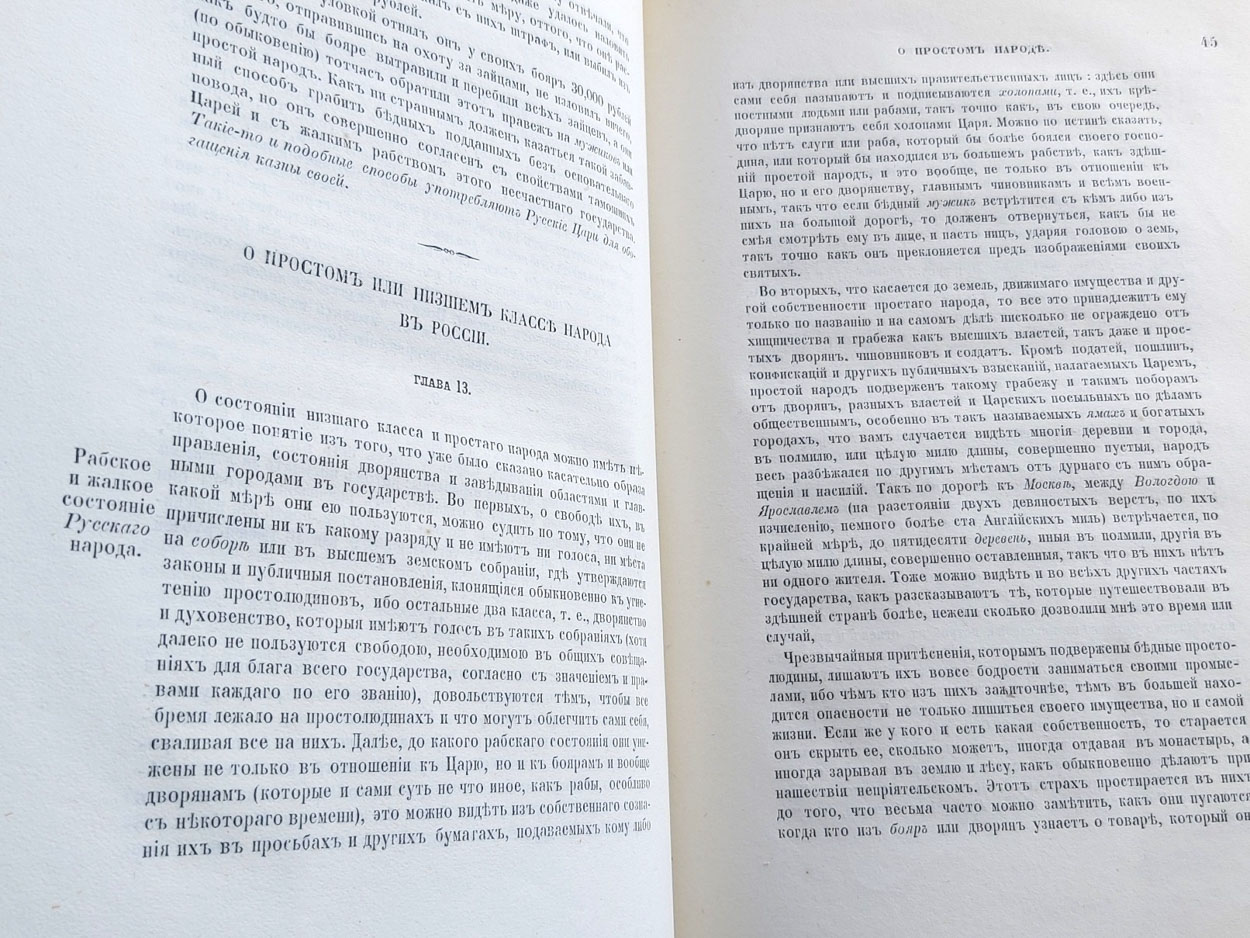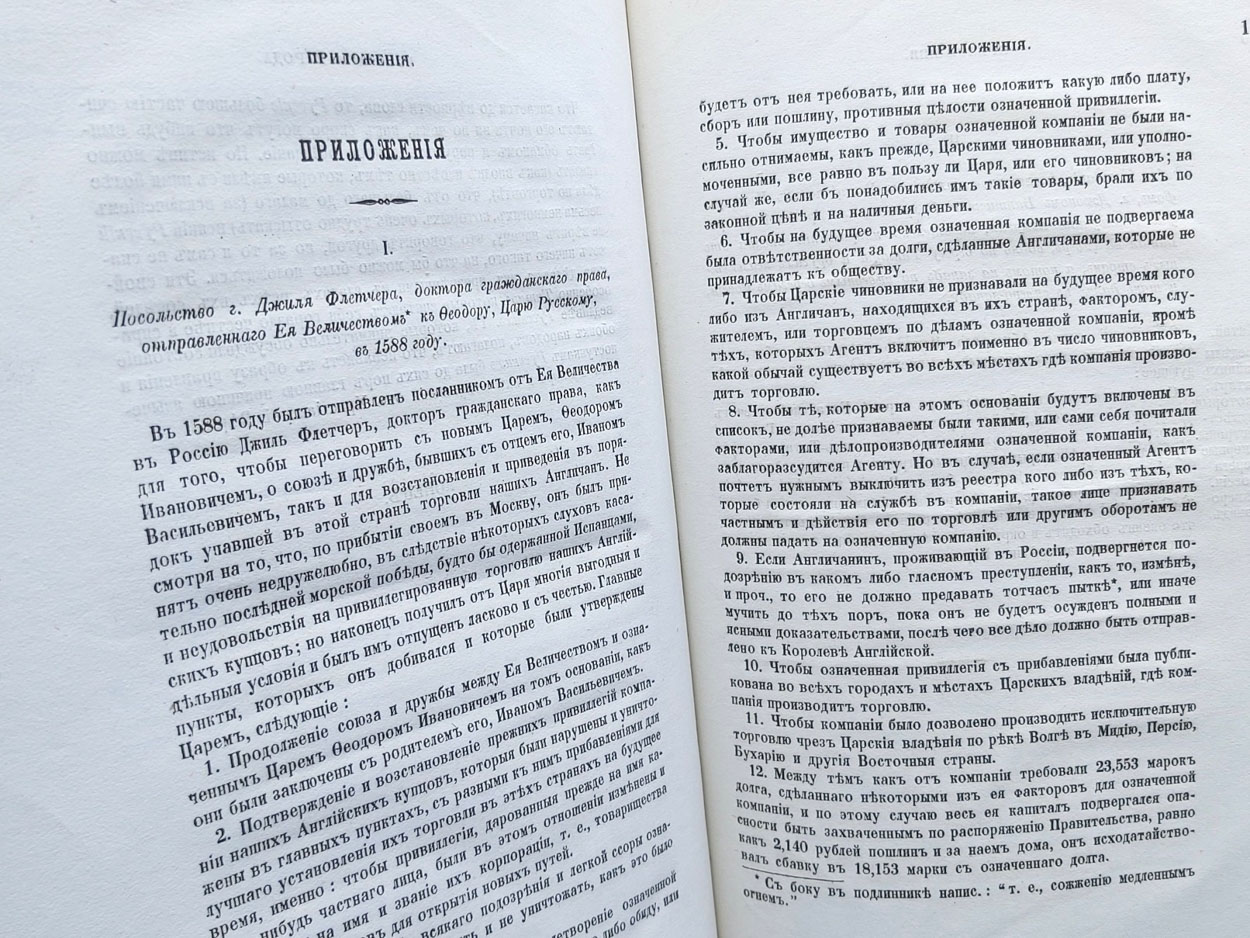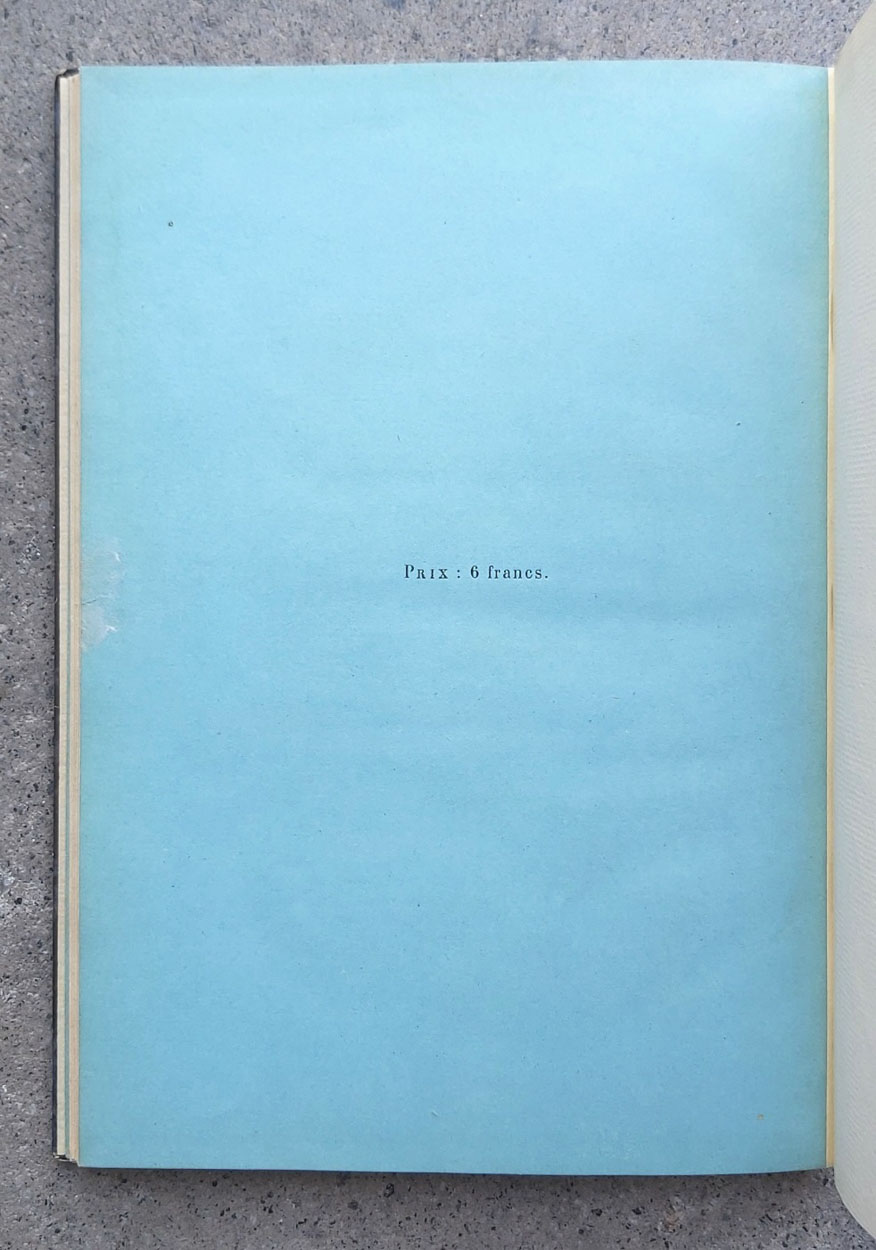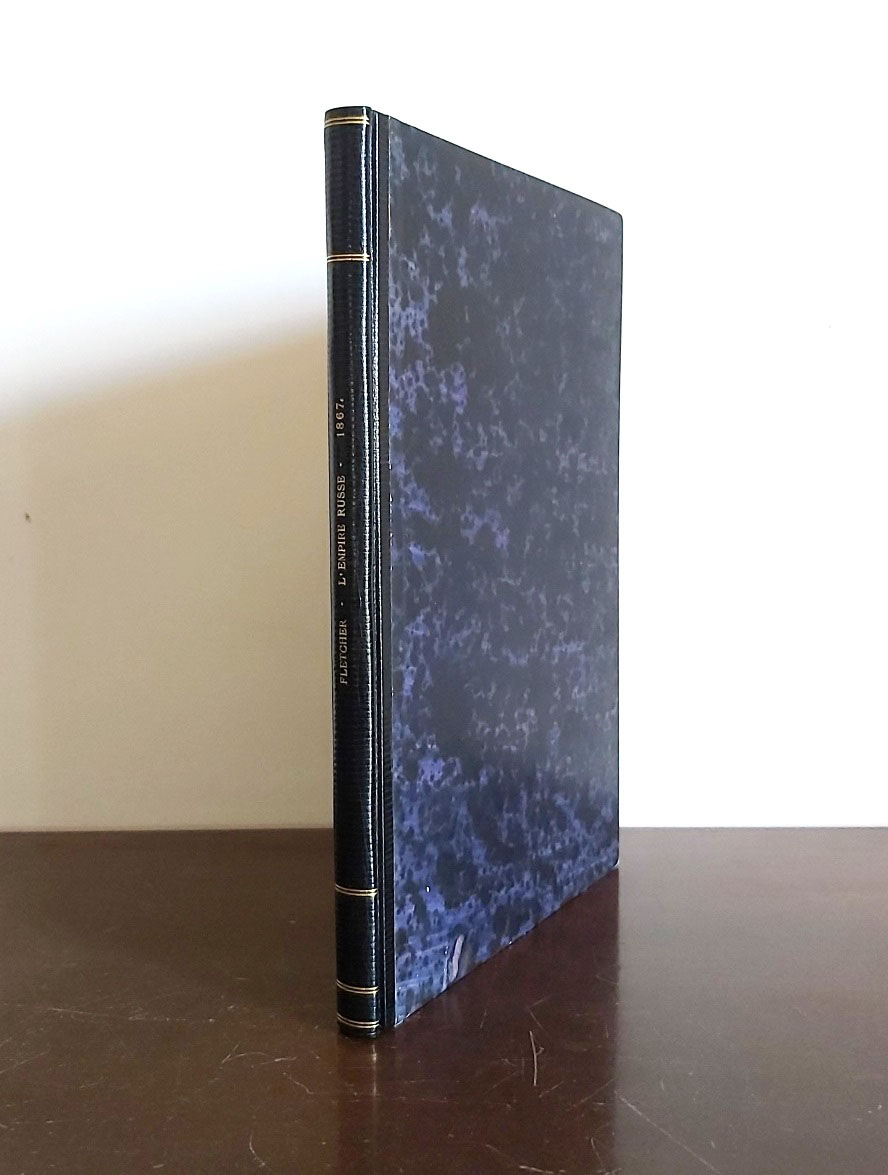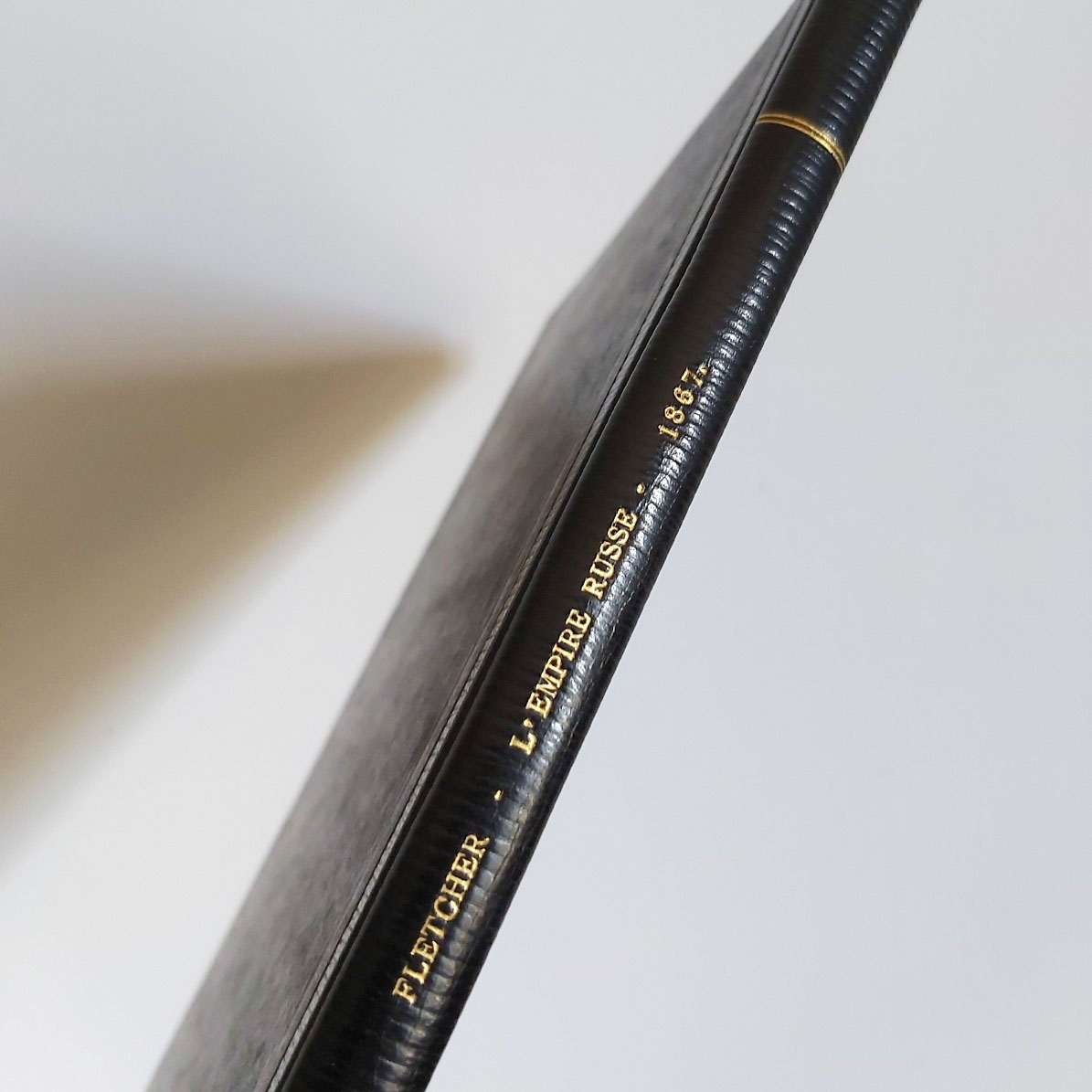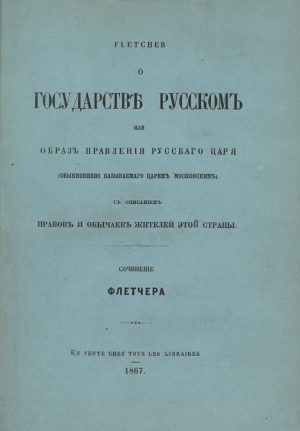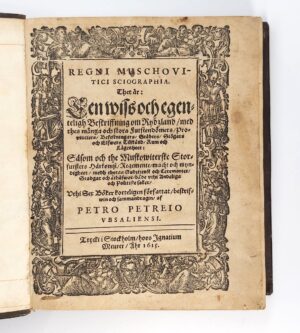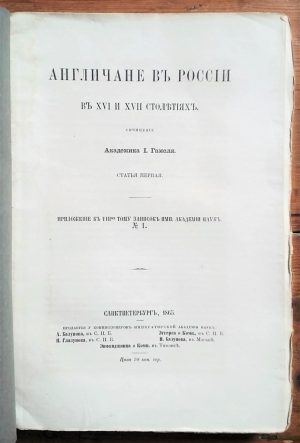Our Notes & References
A beautiful example of the first book edition in Russian – or when the revolutionaries look back 300 years.
A work more than 430-year old, Of the Rvsse Common Wealth was “confiscated, abridged and banned, and its already printed edition festered for decades. The Queen of England and two Russian emperors personally decided its fate, and despite their differing reigns and temperaments, each monarch rendered a negative verdict. The adventures of this book reflect, as in a mirror, the historical epochs and social attitudes of both countries” (Karatsuba, our translation here and below).
The English diplomat and scholar Giles Fletcher (1546-1611) wrote his celebrated work at “a time of a new acute conflict between England and Russia. Shortly before Fletcher’s arrival in Moscow, the English trading company “Moskovskaia kompaniia” had obtained the privilege of […] duty-free trade in 1586″ (Rogozhin, Gerasimova). However, the company’s clerk, Anthony Marsh, was accused of fraud by the Russians, and Fletcher was sent to look into the matter. Badly received in Moscow and treated there as a criminal, the English diplomat returned home embittered and gave a rather derogatory characterisation of Russia in his book, published in London in 1591. A scandal then broke out: English merchants trading with Russia appealed to Elizabeth I to ban such a book which could have been harmful to their trade. As a result, most of the copies were confiscated and only a few survived.
The first complete edition (with additional notes by Jerome Gorsey who accompanied Fletcher on his return journey) appeared in England as late as 1856, at the height of the Crimean War, and the Cold War reignited interest in the work, the preface of the 1966 facsimile edition describing it as “a pioneering study of what we today define as totalitarianism […] written with a stunningly modern, one might say sociological, terminology” (quoted in Karatsuba).
The fate of Fletcher’s work wasn’t smoother in Russia: a copy of the first edition remained in the archives of the Posolskii prikaz (later the Ministry of Foreign Affairs) until it was unearthed at the beginning of the 19th century by Nikolai Karamzin, while working on his celebrated History: It is said that the monarchist Karamzin owes much of his sharp criticism of Ivan the Terrible to Fletcher’s account.
The very first translation into Russian was published on in in 1848, at the initiative of Prince Mikhail Obolenskii and Dmitrii Gippius, respectively the director and the translator of the Moscow archive of the Ministry of Foreign Affairs. It was rather discreetly published in the 23rd volume of the Chteniia v obshchestve istorii i drevnostei rossiiskikh [Readings in the Society of Russian History and Antiquities]. As a result, the Minister of Public Education Sergei Uvarov, having learned about this publication, required the resignation of Sergei Stroganov, head of the Moscow censorship committee and chairman of the Society; the Society’s scientific secretary Osip Bodianskii was dismissed from the Moscow University, and the entire circulation of the 23rd volume was confiscated.
In the more liberal years of the early 1860s, Bodianskii suggested to release the remaining sheets already printed. This was a complicated matter, top officials were involved, discussions, meetings – until a special meeting of the Committee of Ministers in 1864, where ten voted ‘for’ and only four ‘against’. Unfortunately for the liberals, but both the chairman and the emperor himself chose to support the minority, and the question of publishing Fletcher was shelved for a long time: another 30 years before a 1897 bibliophile edition by Burtsev.
“[Gippius’] translation was eventually published in 1867 in Geneva, at the Free Russian Press, in a tiny circulation which reached Russia mainly after 1905” (Zaionchkovskii, quoted by Karatsuba). The edition includes Obolenskii’s prefaced. A supplementary print-run occurred in 1868, with slightly different details: “Genève, Impr. russe de Londres L. Czernieski [sic], 1868”.
The publisher of this 1867 edition was Viktor Ivanovich Kasatkin (1831-67), a Russian revolutionary and writer. In 1858-62 he was an employee and co-publisher of the magazine Bibliograficheskiie zapiski [Bibliographical Notes], at a time when he took part in illegal revolutionary groups in Moscow, including “Zemlia i volia” [“Land and Freedom”]. From 1859 he was a correspondent for Herzen’s almanack Poliarnaia zvezda [Polar Star] and his London-based Free Russian Press, which was publishing many Russian works forbidden in Russia. As a result, he left Russia in 1862, got charged there for revolutionary activity and tried in absentia during the “Process of the 32” (1862-1865); on December 10, 1864 the Senate deprived him of all property and sentenced him to exile from Russia forever. While in Switzerland, Kasatkin co-directed the press of the “Land and Freedom” Society and organised the transport of illegal revolutionary publications to Russia. He died unexpectedly in Geneva late December of the very same year when Fletcher’s volume was at last seeing the light in Russian.
Very rare: only two copies are listed in WorldCat (UCL -apparently the only example in the UK- and Institut catholique de Paris), to which we could add only the RNB copy in St. Petersburg. We could not trace any copy appearing on the Russian and Western markets in recent decades.
The oldest Russian edition of Fletcher’s work in the collections of the Russian State Library in Moscow seems to be Suvorin’s edition of 1905, the first separate book edition published in Russia, more than 300 years after the original appeared.
The additional copies printed in Geneva in 1868 are also rare: we could not trace any example in Western libraries, and only one in Russia, in the RNB.
Bibliography
Svod. Kat. russk. nelegalnoi i zapreshchennoi pechati XIX veka 2253 (apparently significantly cut down compared to our copy, as the size mentioned is 15 x 9 cm).
Alekseev M. P. Sibir v izvestiiakh zapadno-evropeiskikh puteshestvennikov i pisatelei: Vvedeniie, teksty i kommentarii: XIII-XVII vv. 2e izd. Irkutsk: OGIZ, obl. izd., 1941.
Afoniushkina A. V. K voprosu o razvitii istochnikovoi bazy istoricheskoi nauki v Rossii v 40-60kh godakh XIX veka // Izv. Sarat. Univ. Ser. Istoriia. Mezhdunarodnye otnosheniia, 2020, T. 20, vyp. 4, pp. 437-444.
Belokurov S. A. « Delo Fletchera » 1848-1864 gg. // Chteniia v Obshchestve istorii i drevnostei rossiiskikh. Kn. 3, Moskva, 1910.
Gerasimova G. I. Rogozhin N. M., Proezhaia po Moskovii: Rossiia XVI-XVII vekov glazami diplomatov. Moskva, Mezhdunarodnye otnosheniia, 1991.
Istoriia dorevolutsionnoi Rossii v dnevnikakh I vospominaniiakh / Pod red. P. A. Zaionchkovskogo, T. 1, Moskva, 1976, p. 10.
Karatsuba I. « Rossiia i Angliia v zerkale knigi Dzhailsa Fletchera: iz istorii obshchestvennogo samosoznaniia I natsionalnykh kompleksov »// Otechestvennye zapiski, 2007, #5.
Kate Sealey Rahman, ‘Russian Revolutionaries in London, 1853-70: Alexander Herzen and the Free Russian Press’, in Foreign-Language Printing in London 1500-1900, ed. Barry Taylor (Boston Spa and London: The British Library, 2002), pp. 227-40.
Physical Description
Octavo (22.4 x 15.8 cm). XI incl. half-title, second 1591 title, Fletcher’s dedication leaf and 116 pp.
Binding
Original printed blue wrappers bound in late 20th-c. dark blue marbled boards, black straight-grained leather flat spine, gilt lettering.
Condition
Wrappers minimally stained and restored, very small rubbing to binding’s extremities, otherwise excellent and beautifully fresh.


